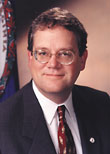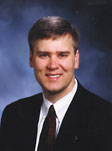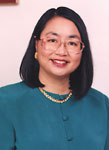| Home
Contents
Athletics
Alumni
Classnotes
Editor's Page
Philanthropy |
Tech produces two leading environmental advocates
Environmental professionals across the state recently recognized two Tech alumni as outstanding environmental leaders in Virginia. Both Joseph Maroon (political science '78), Virginia executive director of the Chesapeake Bay Foundation, and Dennis Treacy (forestry and wildlife '78), director of the Virginia Department of Environmental Quality, were honored for a range of environmental achievements and initiatives.
Maroon and Treacy have led their respective organizations to environmental successes on a number of fronts. When Maroon joined the Chesapeake Bay Foundation (www.savethebay.cbf.org) 15 years ago, one of his first priorities was helping to ensure that Virginia was a full partner with its neighbors in the bay clean-up efforts. Over the past three years, Maroon's organization has defined a series of indicators by which to measure the bay's progress. Although the bay has improved somewhat, the foundation's 1999 scorecard pegged it at a 28 out of a possible 100.
In the past two years, the foundation helped institute legislation governing poultry waste management and non-tidal wetlands protection, items Maroon describes as "some of the most important legislation passed in Virginia in the past decade." He is optimistic that significant improvement in the bay lies within reach "if we can continue the progress made by business, government, farmers, and the public to date." reach "if we can continue the progress made by business, government, farmers, and the public to date."
While Maroon is working to save the bay, Treacy is focusing on instilling a proactive model of environmental protection throughout Virginia. "I'm very proud of our enforcement and permitting programs, but we're also looking at new dimensionsencouraging pollution prevention efforts before pollution even starts," Treacy said. "We want to show that prevention can actually be cost-saving to business." In 1998, the DEQ developed a pollution-prevention program to spearhead this extensive effort. The program oversees a range of priorities, from encouraging greater energy efficiency to convincing all Virginia military bases to replace certain paints and solvents with materials that generate less waste.
 Under Treacy's leadership, the DEQ has extensively utilized information technology to increase public awareness of and participation in environmental initiatives. "We are trying to open the doors of DEQ to the public with the website," Treacy said. Among other things, the site, located at www.deq.state.va.us, includes state regulations, permitting requirements, public notices, breaking news, and background information about the pollution- prevention program. Under Treacy's leadership, the DEQ has extensively utilized information technology to increase public awareness of and participation in environmental initiatives. "We are trying to open the doors of DEQ to the public with the website," Treacy said. Among other things, the site, located at www.deq.state.va.us, includes state regulations, permitting requirements, public notices, breaking news, and background information about the pollution- prevention program.
|
Derx bridges digital divide with e-Buddies
 Lisa Derx (English '87) has been named executive director of e-Buddies, an innovative new program that uses Internet technology to build friendships between people with mental retardation and non-disabled volunteers. Participants commit to e-mailing a buddy at least once a week for one year. The friendships created by this online correspondence are challenging stereotypes, bridging a little-known digital divide, and proving immensely valuable for the e-buddies themselves. Lisa Derx (English '87) has been named executive director of e-Buddies, an innovative new program that uses Internet technology to build friendships between people with mental retardation and non-disabled volunteers. Participants commit to e-mailing a buddy at least once a week for one year. The friendships created by this online correspondence are challenging stereotypes, bridging a little-known digital divide, and proving immensely valuable for the e-buddies themselves.
One of the greatest challenges Derx has faced so far is the perception that people with mental retardation cannot learn computer skills. "Many parents and families do not believe they're capable, but they are capable, and they can learn. We're proving that every day," she said. Once they can look forward to hearing from a friend, many have learned much more than basic computer skills. Some have improved eye-hand coordination; others have found the motivation to go back to school.
e-Buddies is an offshoot of Best Buddies International, a non-profit organization founded by Anthony Kennedy Shriver to provide social and employment opportunities for people with mental retardation. Before being named executive director of e-Buddies, Derx worked for Best Buddies for nine years, also serving as that organization's first executive director. Derx encourages people to sign up. "It's an easy way to volunteer and discover the joy of making a huge difference in someone's life. And it can happen on your own terms, any time day or night, from the convenience of a computer," said Derx. Volunteers simply need access to a computer and an e-mail account, and they can sign up at www.ebuddies.org.
|
 Alumnus steers White House into Internet age Alumnus steers White House into Internet age
As the White House's first full-time webmaster and e-mail administrator, Timothy Heberling (computer science '86) was pioneering uncharted territory in 1994. In addition to developing content for the first White House website, Heberling maintained the official web and e-mail servers and monitored thousands of incoming e-mails every day looking for potential terrorist threats to forward to the Secret Service for tracing. At a time when many electronic protocols had yet to be established, he also had to keep technical functions running smoothly. In one case, computer hackers subscribed the White House e-mail server to so many listservs that the number of incoming messages simply crashed the system. "There were tons of e-mails coming in, and we were scrambling to figure out what was going on," Heberling said. "Now they have systems in place to keep 'storms' from overwhelming the servers."
During his tenure with the White House, Heberling convinced the office of the first lady to receive e-mail; automated the transfer of e-mails to the correspondence offices of the president, vice president, and first lady; and took the initiative to personally respond to public feedback about the government's new electronic resources. The website Heberling helped develop, based on citizen input, remained posted from 1996 until a new design was recently implemented.
The strides made by the Clinton administration in bringing government to the people through the Internet could not have happened without Heberling's contributions. "It went from an experiment to a medium," Heberling said of his system administrator days at the White House. "And I'm proud to have been part of the transition."
|
Alumna passes on the value of mock trials to students
When students participate in mock trials, the cases may not be real, but the results are nothing to dismiss. The mock trial process plunges students into the courtroom arena, allowing them to experience the judicial system firsthand and hone the critical thinking and communication skills necessary to succeed as professionals. Jennifer Bierly (urban affairs '94), a trial attorney in Pennsyl vania, recently won the State College Area Jaycees' Award for Outstanding Community Service by an Attorney for advising and coaching the Penn State University Mock Trial Team and acting as co-district coordinator for eight local high school teams through the Pennsylvania Bar Association Young Lawyers Division.
"It is invaluable for students to see the trial process in action," Bierly said. She learned the value of mock trials by participating in them as a law student at the University of Pittsburgh, and she is committed to providing students with the same opportunity. In addition to volunteering as a coach and advisor herself, Bierly has recruited numerous colleagues to support the teams' efforts. "Students couldn't do this without the help of local attorneys to coach them and judge the trials," she said.
The mock trial cases are "exactly the kinds of things that a criminal defense or prosecuting attorney might see in the real world," Bierly said. She works in general litigation with an emphasis on criminal defense and domestic law.
|
 Surgeon offers modern version of Fountain of Youth Surgeon offers modern version of Fountain of Youth
Cosmetic surgeon Lance Grenevicki (biology '89) has become one of America's leading professionals in the anti-aging arena for his work with microdermabrasion, an innovative procedure that reduces facial wrinkles and other skin blemishes. As one of the first U.S. physicians to offer this alternative cosmetic treatment, Grenevicki recently spoke about the procedure to millions of listeners during an Associated Press radio interview at the annual meeting of the American Academy of Cosmetic Surgery.
Microdermabrasion was introduced in the U.S. just over a year ago. It is a completely painless way of rejuvenating the skin by applying a gentle sand blasting with a special unit. "The collagen in the skin cross-links with other cells and fibers nearby, which tightens the skin and reduces wrinkles on the face," Grenevicki said. The process also treats other skin irregularities, like age spots, abrasions, and scars. It requires no anesthesia, and patients can even go right back to work.
For successful results, the procedure requires regular visits, and it works best in combination with an ongoing skincare regimen, which Grenevicki's practice, New Image Maxillofacial, also provides. "I've had tremendous response from clients. I can't think of anyone who's had any negative feelings," Grenevicki said.
|
 Oliver shares secrets of historical and modern floral arranging Oliver shares secrets of historical and modern floral arranging
The work of floral arranger, author, and lecturer Libbey Oliver (horticulture '70) is featured in both Southern Living and an upcoming issue of Better Homes and Gardens. As manager of floral services for the Colonial Williamsburg Foundation for nearly 23 years, Oliver has been praised as "America's gift to communicating beauty" for her contributions to the floral and horticultural industries, and in 1994 she was named National Flower Arranger of the Year by the American Horticultural Society.
Oliver wasn't a history buff during her days at Tech, but working for Colonial Williamsburg inspired a love of bringing the past to life with her arrangements. "I got to cover three centuries of time, from interpretive period pieces to the latest designs," she said. Oliver also discovered that colonial decorations lend themselves to even the most contemporary settings, like the holiday set of Good Morning America, which she designed for six years.
Today, Oliver uses her work experiences in her own consulting business, Libbey Oliver Flowers & Gardens. Everyone from the casual consumer to the experienced arranger will also find something of use in her most recent books, Flowers Are Almost Forever and Williamsburg Christmas, the latter co-authored with Mary Miley Theobald. She has also collaborated with Theobald on an upcoming historical book, Four Centuries of Virginia Christmas.
|
 Feng shui expert featured in TIME magazine Feng shui expert featured in TIME magazine
When a writer from TIME magazine was looking for "a friendly piece on feng shui," he was directed to Angi Ma Wong (English '68), intercultural consultant, corporate trainer, and founder of Pacific Heritage Books. Wong has earned international recognition as an expert on the U.S.-Asian business market, and her work touches on a wide range of subjects, from the conventional to the non-traditional. Her corporate client list includes Universal Studios, AT&T, Bank of America, and United Way, among many others.
"I'm a cultural missionary at heart. I like to build bridges," Wong said. Helping her clients practice feng shui, a Chinese environmental system of placement and energy alignment, is just one of the cultural bridges Wong provides. "People are looking for a simpler way of life. They're seeking peace and serenity in this maelstrom of change, and feng shui offers that." Wong's experience on the subject comes largely from her childhood. "You can't miss feng shui growing up in a Chinese family. It was part of my upbringing just by osmosis," she said.
Another family legacy at the heart of Wong's professional life is service. "My family has always been dedicated to community service ," she said. "Tech's motto, Ut Prosim, is the thread through my life."
|
|